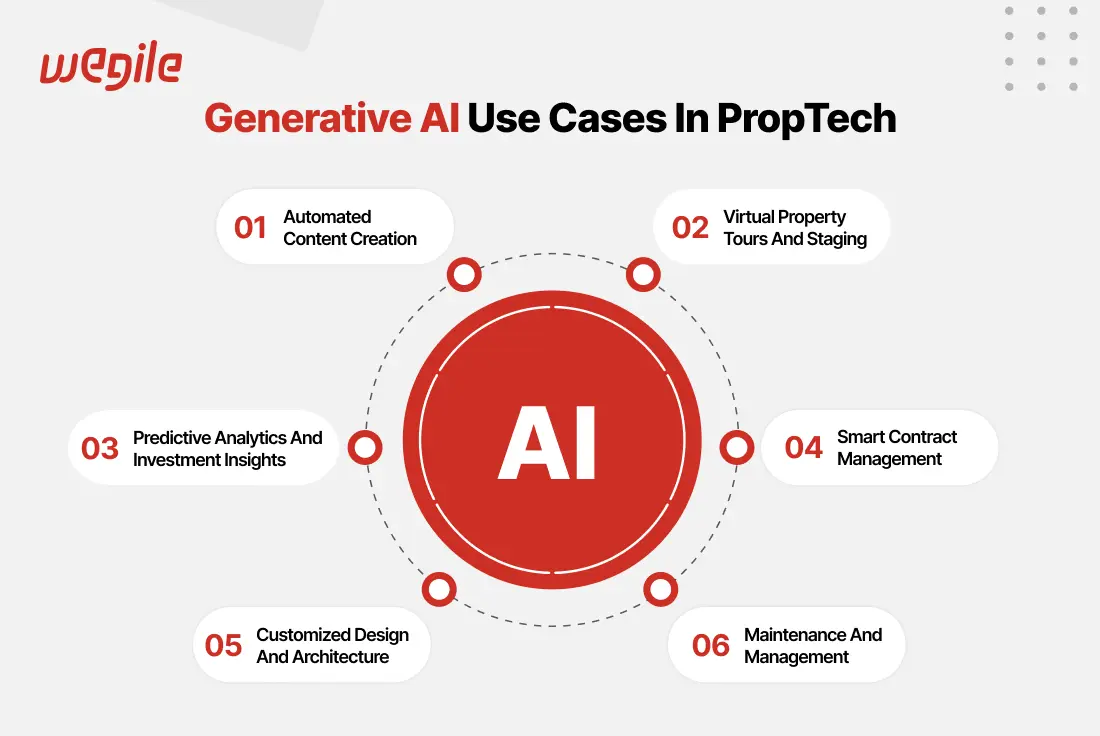The real estate sector is evolving, driven by the groundbreaking integration of generative AI in PropTech. This transformative technology does more than automate mundane tasks; it pioneers intelligent solutions that enhance property visualization, investment analysis, and even architectural design processes. As digital and physical worlds intersect, generative AI sets new benchmarks for efficiency and innovation in real estate. And, as the lines between the digital and physical worlds blur, how much impact can generative AI have on the real estate sector ? And more importantly, are we ready to embrace this revolution in PropTech?
Immerse yourself in the sophistication of generative AI and its applications in the property industry through our in-depth blog. The possibilities are limitless, from creating engaging virtual tours that save time and money to leveraging predictive analytics for making informed investment decisions. We invite you to explore these innovative technologies with us. Are you prepared to transform your property business? Read on, and let's discuss the future of real estate technology together!

GPT-4 amazed us with its understanding and response capabilities, setting a new standard for what AI can achieve. Now, imagine an even more powerful model. Early whispers suggest that GPT-5 could dramatically expand on the number of parameters, diving deeper into the complexities of human language and interactions. But it's not just about size. The real magic lies in utilizing these parameters for more data, learning, and significantly more nuanced interactions.
Imagine needing to craft an eye-catching brochure or an engaging social media post for a new property listing. Instead of spending hours on design and copywriting, generative AI solutions step in to streamline this process. By inputting basic details about the property, AI tools can generate complete marketing packages that include high-quality images, compelling property descriptions, and attractive headlines. This speeds up the marketing process and ensures the materials are polished and professional, instantly capturing potential clients' attention.
Reports and documents are staples in real estate transactions and management. They often require meticulous attention to detail and can be pretty time-consuming to produce. Generative AI changes the game in the real world by automatically generating these documents. Whether it's a detailed property analysis report for investors or a maintenance schedule for property managers, AI can compile data, analyze trends, and produce comprehensive documents that are both accurate and informative. This capability saves time and reduces the likelihood of human error, ensuring that stakeholders have reliable information at their fingertips.
Staging a property involves furnishing the space to make it more appealing to potential buyers. With AI-powered virtual staging, this process becomes less costly and more creative. AI can digitally furnish an empty room, adjust decorations, and even alter wall colors to suit different tastes and styles. This not only helps in visualizing the potential of a property but also allows for customizable staging options that cater to diverse buyer preferences, enhancing the property's appeal and significantly boosting its marketability.
Staging a property involves furnishing the space to make it more appealing to potential buyers. With AI-powered virtual staging, this process becomes less costly and more creative. AI can digitally furnish an empty room, adjust decorations, and even alter wall colors to suit different tastes and styles. This not only helps in visualizing the potential of a property but also allows for customizable staging options that cater to diverse buyer preferences, enhancing the property's appeal and significantly boosting its marketability.
With generative AI, predicting the future value of properties and understanding market trends have become more accurate. This technology analyzes vast amounts of data: past sales, neighborhood trends, economic indicators, and emerging market influences to forecast property values. For investors, this means predicting which properties are likely to appreciate, making it easier to decide where to invest their money for the best return. This foresight helps avoid the pitfalls of investing in declining markets and captures opportunities in rising locales.
Investing in real estate is not without risks, but generative AI can significantly reduce uncertainty. AI models can identify potential risks associated with particular investments by processing historical data and current market conditions. Whether it's the likelihood of natural disasters, changes in local property laws, or shifts in the economic landscape, these AI-driven assessments help investors mitigate risks before they become problematic. This capability secures investments and ensures stability in the ever-volatile real estate market.
The traditional process of drafting lease agreements and managing transactions is often laden with paperwork and prone to errors. Generative AI streamlines this by automating the creation and management of lease agreements. By inputting key details, AI systems can draft customized lease documents that comply with local laws and regulations. Moreover, rent payments and lease renewals can be automated, ensuring timely execution and reducing the administrative burden on property managers and tenants.
The reliability and efficiency of contracts are crucial in real estate transactions. Generative AI enhances these aspects by ensuring that contracts are drafted precisely and managed effectively throughout their lifecycle. AI systems monitor contract terms, send reminders for upcoming obligations, and alert parties to discrepancies or forthcoming deadlines. This proactive management helps prevent disputes and ensures all contractual terms are met, making the process smoother and more dependable.
Imagine walking into a home that fits your style and needs, ideally as if it were tailor-made. That’s what AI-driven design can achieve. By analyzing your preferences, lifestyle, and future needs, AI can suggest designs that match perfectly with your vision. Whether the kitchen layout or the living room's aesthetics, AI tools can craft multiple design options, allowing clients to visualize potential homes before a single brick is laid. This not only ensures client satisfaction but also saves on costly redesigns.
One of the standout features of AI in architecture is its ability to simulate and visualize architectural outcomes. This means you can see how your building will look under different conditions before it's even built. Will it get enough natural light? How will it look during other times of the day or seasons? AI simulations can answer these questions, allowing for adjustments in the design phase, which can significantly improve the functionality and appeal of the property once it's constructed.
AI transforms property maintenance from reactive to predictive. Traditionally, maintenance issues are addressed after they arise, but AI allows for a more proactive approach. By analyzing data from various sensors and systems within a building, AI can predict when a part of the property will likely need repairs or replacement. This helps avoid the inconvenience of sudden breakdowns and significantly reduces maintenance costs by addressing issues before they escalate into major repairs.
Managing a property involves many tasks, from handling tenant inquiries and managing budgets to ensuring compliance with regulations. AI tools streamline these processes by automating routine tasks, organizing data, and facilitating communication. For instance, AI can automatically send reminders to tenants about rent payments or maintenance schedules, manage energy use more efficiently to reduce costs and ensure that the property complies with all local laws and regulations. This automation reduces the workload for property managers and increases the efficiency and profitability of property management.
The pace at which AI technology advances suggests that what we’ve seen is just the beginning. Future AI systems are expected to be far more intuitive and capable of handling complex tasks more precisely. Imagine AI tools that automatically design entire neighborhoods based on demographic data and predicted population growth or systems that seamlessly integrate renewable energy solutions into building designs to promote sustainability. As AI becomes more sophisticated, it will be able to handle not just isolated tasks but entire projects, from initial design through to construction and management, all optimized for efficiency and sustainability.
As more stakeholders in the real estate sector recognize the benefits of generative AI, its adoption is set to increase, leading to significant transformations in the industry. Broader adoption of AI could lead to more personalized real estate services, where searches and transactions are tailored to the individual needs of buyers and renters with unprecedented accuracy. This could streamline the buying and selling process, making it faster, more efficient, and potentially even more affordable as AI-driven processes reduce overhead costs. Additionally, as AI technology becomes a standard tool in real estate, we could see a shift in job roles within the industry, with new positions created for managing and optimizing AI operations.
The future of generative AI in PropTech is not just about technological advancements but also the collaborations that will drive these innovations. We can expect to see partnerships between AI developers and real estate professionals, as well as collaborations with government bodies to ensure that the deployment of AI in real estate adheres to regulatory standards and promotes public good. These collaborations could lead to innovative solutions like AI-driven intelligent cities, where everything from traffic management to public safety is optimized using AI. We could see innovations that integrate AI with other cutting-edge technologies like blockchain for secure and transparent property transactions or IoT (Internet of Things) for more innovative home automation that enhances convenience and conserves resources. Integrating AI with virtual and augmented reality could also revolutionize property showings and inspections, making them more detailed and interactive.
The terrific impact of generative AI in PropTech is reshaping the real estate industry. This cutting-edge technology goes beyond automating tasks; it's revolutionizing property visualization, investment analysis, and even architectural design processes. With such profound changes afoot, the question isn't just about what AI can do but whether we're ready to harness its full potential.
Are you prepared to explore the possibilities of generative AI? At Wegile, our Generative AI App Development Services are tailored to help you navigate this new technological landscape. Whether you want to streamline property designs or manage complex portfolios effortlessly, our advanced AI tools are designed to meet your needs. Embrace the future of real estate with Wegile and discover how our solutions can elevate your business. Let’s innovate together and unlock new opportunities with generative AI!


 Browse Our Services
Browse Our Services
